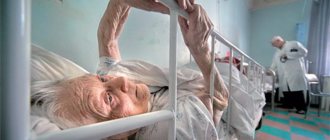Caring for people with dementia places a heavy burden on many families. Physical and material difficulties are complemented by the great emotional burden that relatives have to experience as the personality of a loved one disintegrates. A progressive neurodegenerative disorder over several years completely deprives a person of individuality, thinking and physiological abilities. The disease has a poor prognosis; after diagnosis, life expectancy is on average 7 years. Proper care for older people with dementia can reduce the rate of development of cognitive impairment. Without proper care, they will not be able to cope without the help of outsiders in 2-3 years.
How to behave with a sick person
At the very beginning of the manifestation of dementia, many patients do not need outside care, but gradually, as the pathology develops, sick people can no longer do without help. There are different ways to care for a patient with dementia; when choosing a care option, you should be sure to take into account how each person reacts to the changes that are happening to them, and in no case should you be disrespectful or tactless towards the patient. When organizing care, it is important to take into account that if a person is ashamed of the fact that he needs outside help, this fact should never be emphasized. On the contrary, it is necessary to regulate the patient’s independence in every possible way and provide assistance unobtrusively.
Content:
- How to behave with a sick person
- What to do with a dementia person
- Nutrition for dementia syndrome
- Patient hygiene
- Exercises for people with dementia
- Sleep with dementia
- Patient safety
- How to remove aggression
- Treating specialist
- Institutions for patients
In severe stages of dementia, patients may require a carer with specialized skills and sometimes medical training. Many patients want to see only a family member next to them, because they are embarrassed by their powerlessness.
If it is impossible to provide adequate home care for the patient, today it is possible to provide him with comfort in a specialized boarding school for patients with similar problems.
When caring for a dementia patient, it is important to provide him with all possible moral support, always fulfill his wishes, and not make him feel embarrassed about his situation or experience discomfort. Communication must be built on equal terms; in no case should you communicate condescendingly or condescendingly with a sick person, since shyness will further aggravate his mental problems, which can lead to an exacerbation of the disease.
Consequences
There is also ample evidence about the role of psychoanalytic practices in supporting people with advanced dementia. This applies not only to the direction of clinical contact with individual objects, but also allows us to think about the physical and emotional environment. This should include taking care of their environment, their personal belongings, their access to music, photographs, etc. They also need to have contact with people. Psychoanalytically informed practice should extend to all professional staff and family caregivers with access to psychological education and the Balint Group (Roberts, 1994).
Physical (internal and external) and psychological abuse (mainly loss and shame) continue to affect people after the onset of dementia. Changes in behavior and mood are associated with a complex interaction between the psychological and biological domains, but in dementia there is a biological hegemony. The concern of doctors (including me) about the missing is palpable. We seem to worry less that we may be missing something “psychological.” We can treat painful mental conditions, or allow them to outgrow if they are ignored or misinterpreted. The transition to a psychoanalytic approach has enormous educational and resource implications especially for health and social services.
What to do with a dementia person
When planning the leisure and everyday life of people with dementia, it is necessary to create conditions in which patients can demonstrate their abilities to the maximum. All classes are carefully thought out in advance and structured in such a way as to maximize the patient’s self-esteem and restore his self-esteem.
Being busy with everyday household chores helps make a person feel important and needed by the family. However, it is important to remember that with Alzheimer’s disease, the patient’s consciousness constantly shifts for the worse, so when assigning household chores to him, it is important to take into account his daily state and in no case irritate or overload him.
It is important to support the patient's past hobbies. If a person has previously drawn beautifully, you can resort to art therapy in everyday life by asking him to draw some kind of pleasant subject. At the same time, the patient must be praised for any result, since the most important thing in this activity is not it, but the process itself, in which a person can concentrate, structure his own sequence of actions, and come to a specific result. This has a great effect on both the emotional sphere and brain activity.
Alzheimer's disease - insidious and unknown
Alzheimer's disease is not just forgetfulness at the first signs of aging. This is a merciless and insidious disease that takes away a person’s memory, depriving him of all memories. The reasons for the development of the disease are unknown, but they are usually associated with the destruction of nerve cells, deficiency of substances that are responsible for transmitting impulses, heredity, head injury, heavy metal poisoning, and hypothyroidism. The disease usually lasts from 5 to 10 years. No cure has been found for this disease; over time, the symptoms slowly but steadily progress.
Nutrition for dementia syndrome
Eating problems in dementia become increasingly worse. This is explained by a progressive inability to remember what and when you can and should eat, which can ultimately result in complete atrophy of a person’s chewing and swallowing functions. The main difficulties when eating with dementia are:
- patients' inability to recognize food;
- patients’ inability to decide what food they like and want to eat at the moment;
- complete refusal of food;
- refusal of force feeding;
- requirements for inadequate combinations of products.
Any questions that arise in this case must be discussed with your doctor. If the patient’s condition allows, it is better to let him handle the cutlery himself, directing the cutlery placed in the patient’s hand into his mouth. This process cannot be rushed, so it is necessary to allocate a sufficient amount of time each time to feed the patient.
Patients with dementia very often completely forget about the need to eat or the rules for using cutlery. In severe and late stages, a person needs to be spoon-fed. Among the main physical problems when eating food is the inability to chew or swallow food normally. A person needs to be constantly reminded of what to eat. It is important to offer him food that can be easily eaten with his hands. Also, food should be cut very finely so that in the absence of normal chewing it cannot be choked on.
In complex, severe stages of dementia, the patient should be fed liquid food that is not too hot, since the patient may not differentiate between hot and cold and may get burned. If you have problems with the swallowing reflex, it is important that your doctor prescribe the necessary stimulants for this process.
Patient hygiene
Caring for a patient with dementia necessarily involves monitoring his compliance with personal hygiene rules. Emerging mental features in this disease contribute to the patient’s disdainful attitude towards these functions.
It is imperative to monitor daily how thoroughly the patient washes his hands, genitals, brushes his teeth, and whether he does this at all. In this case, observation should be extremely delicate, since many sick people can painfully perceive the presence of another person in the bathroom and demand to leave him alone out of self-esteem.
Organization of space
Caring for a senior with dementia requires a safe space. It is necessary to remove dangerous and complex mechanisms from view and keep simple and harmless objects within reach. Household appliances should perform only one function. Buy an electric kettle with automatic shut-off, this will prevent the room from catching fire.
If dementia manifests itself in an active form and a person strives for unconscious actions, it is necessary to secure the premises as much as possible:
- Buy locks for the windows;
- Insert plugs into the sockets;
- Change the door lock;
- In your absence, turn off the gas and turn off the water, leaving the required amount of food and liquid on the table;
- Hide toxic substances, piercing and cutting objects.
If you are agitated, you should consult a doctor. The doctor will prescribe medications that reduce the patient's activity.
Exercises for people with dementia
In order to stimulate the cognitive abilities of patients, specialists have developed many games and exercises, performing which the patient partially restores memory, speech, ability to think and reason, as well as improves the emotional state and increases self-esteem. Spending time with loved ones with someone with dementia has healing power for the person.
Among such games, you should pay attention to modeling from plasticine, the game of classifying various objects, creating your own book and keeping an autobiographical diary, and board games.
You can give a patient with dementia a plasticine ball and ask him to make something simple - a dog, a pear, a cake, for example. These actions will help train your hands and increase the accuracy of coordination of movements. In addition, the whole family can engage in modeling, even involving children in the process, communication with whom is extremely necessary for patients with dementia.
You can ask the person with dementia to correctly classify selected objects. For example, you should give the patient a box of buttons and ask him to sort them by size or color. The same can be done with berries, fruits and any other items. This activity will help stimulate abstraction, executive functions, and reasoning.
A patient with dementia can be given a stack of magazines in which he will need to find some specific information on a given topic - for example, animals, the sea, food, famous people. After he correctly finds objects in all the proposed magazines, he will have to cut them out and paste them into a notebook, thus creating his own book. This will train your logical thinking and help you better coordinate your movements when cutting.
If the patient likes to write, you can encourage him to create his own autobiographical diary. Each story that the patient remembers correctly can be supplemented by inserting photographs on this topic. If a person does not like to write or at the moment it is difficult for him to do it, the same can be done orally - it is enough that he remembers some life stories and can find illustrative photographs for them from a family album.
In order to stimulate cognitive functions, you can play various board games with the patient. Dominoes, lotto, checkers, and monopoly are great for this purpose. Chess is not a good idea in this case as it is too complex for a person with dementia to understand.
Sleep with dementia
Sleep with dementia is often disrupted, and a person may not sleep all night long. This is often the most difficult thing when caring for a patient, because after being exhausted from the day, the caring relative also needs rest. In order for these situations to happen as rarely as possible, it is worth not allowing the patient to sleep a lot during the day, but it is better to engage him in physical labor as much as possible. Before going to bed, you can go for a long walk with the patient.
Providing a cozy and comfortable sleeping place is the key to ensuring that the patient sleeps long and soundly. To do this, you need to choose a mattress that suits the person’s preferences, pleasant bedding, and the bedroom needs to be ventilated for a long time to enrich the air with oxygen.
Psychological contact
A person with dementia needs to be in a familiar environment; the person is not able to get acquainted with new things and absorb information. At an early stage of the disease, communication on topics of interest helps to slow down the progression of the disease. Treatment and care for dementia depend on the individual's independence.
What to do:
- Let's solve crossword puzzles;
- Allow food to be cooked under control;
- Allow communication with children;
- Encourage dressing well and encourage choice by adjusting clothing for the season.
Try to prevent the person from losing interest in life; passivity and isolation lead to rapid progression of the disease.
Patient safety
The safety of the patient in the home is the main concern in nursing. All things that he may need must be kept within reach to avoid falls or injuries when trying to find and get them.
Household appliances should also be simple, turn on with one button and not cause difficulties with choosing modes and other things. At the same time, it is advisable to keep the patient away from an open fire; it would be better for him to use an electric kettle, which simply turns on and off on its own.
Sometimes dementia patients develop a tendency to wander. This is dangerous because a person can get lost even in familiar places. To do this, you must make him some kind of document that would clearly indicate where he lives and what his name is, and ensure that this document is always with the patient. At a minimum, you should put a note in your clothing pocket with the person’s address so that they can be helped to get home. All entrance doors should be well locked so that the patient does not suddenly leave. But if suddenly a person gets lost, there is no need to scold him.
A small trick that distracts the patient from wandering can be attaching large mirrors to all the doors in the house. The fact is that one’s reflection distracts the patient from thoughts of leaving home and the intention to open doors.
How to remove aggression
Aggression is not uncommon in patients with dementia. The causes of aggression in this case may be:
- other concurrent diseases;
- despair due to the lack of understanding of his needs by those around him;
- stress due to physical or mental overstrain.
When communicating with an aggressive patient, you cannot show your own fear; you must communicate calmly and evenly, as if nothing is happening. Retaliatory aggression can only worsen the patient's condition. Also, you should not stand too close to a patient in a state of aggression, since they will subconsciously perceive this as a threat.
To relieve aggression, it is necessary to switch the patient’s attention to some calming activity or simply wait until the attack of aggression ends. However, all dangerous and heavy objects, such as knives or sticks, should be kept out of the patient’s reach at the time of aggression.
To further prevent aggression, it is necessary to find out what exactly causes it and try to avoid such preconditions in the future. If you experience frequent attacks of aggressive behavior, you should tell your doctor about this.
Treating specialist
A family doctor or internist is the first doctor patients see when they experience signs of dementia. A good general practitioner must have experience working with neurological pathologies in order to promptly notice the slightest deviations in the psyche of his patients. If disturbing symptoms occur, the family doctor will refer the patient for consultation with a neurologist, psychiatrist or geriatrician.
Neurologists are specialists in dementia. They can determine the patient’s neurological status, the presence of organic disorders, and severe damage to the central nervous system. The neurologist will prescribe additional diagnostic procedures to determine the causes of the pathology and prescribe its effective therapy.
A neurologist will determine whether the cause of dementia is a complicated somatic disease that affects internal organs in the body, or an infectious process. If so, then treatment for these diseases is first prescribed, and only then treatment for signs of dementia is prescribed.
If dementia occurs against the background of various brain tumors, this will require surgical intervention. Neurosurgeons first remove the tumor, and after that, rehabilitation and restorative therapy is carried out, designed to slow the progression of dementia.
With further progression of dementia and mental disorders against this background, a psychiatrist treats the patient. He is able to determine the slightest changes in the patient’s psyche, conduct a clinical and psychological personal assessment of the patient and identify the stage of severity of cognitive impairment.
If the impairment is significant, the patient is treated in a psychiatric hospital.
It is the psychiatrist who prescribes the antipsychotic medications that patients with dementia need. He prescribes the dosage, course duration, and helps replace medications in case of intolerance or addiction.
An elderly patient with dementia may be seen by a geriatrician - a doctor who deals with diseases that are characteristic of old age. A geriatrician also understands diseases of the central nervous system in older people and can prescribe the necessary therapy. Those grandparents who, in addition to dementia, have many other diseases associated with age-related changes in the body usually consult a geriatrician.
Counter-transference in working with older people
Countertransference issues with older patients are complex and are sometimes cited as a reason for doing less psychoanalysis with older patients. King (1979) left the end of the analysis with the general fantasy of leaving the patient until his death. Martindale (1989) Describes a doctor's concern about the insecurity of elderly patients, linking this with feelings about parents and grandparents. The desire to give in to their demands for dependence can interfere with the development and progress of analysis. The concept of hatred in countertransference is also important as a particular difficulty for caregivers of people who contain negative aspects of human suffering. These feelings are normal but unpleasant and should be resolved rather than reacted to.
8 pages, 3634 words
Human consciousness
VYATSK SOCIO-ECONOMIC INSTITUTE Faculty of Humanities Test Subject: Pathopsychology III year student, group Ps - 33 Full name: Permyakova Nadezhda Sergeevna Teacher Buldakova Natalya Viktorovna Kirov 2014 1. Compare the main behavioral disorders in old age depending on the genesis Decreased memory and attention - the main ones manifestations of mental aging. With age …











